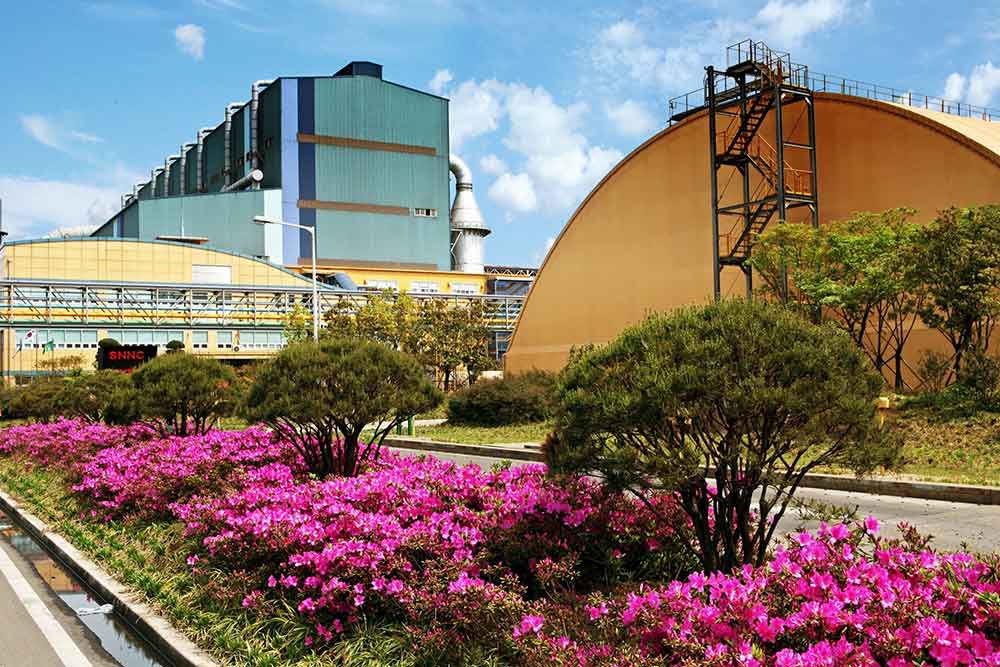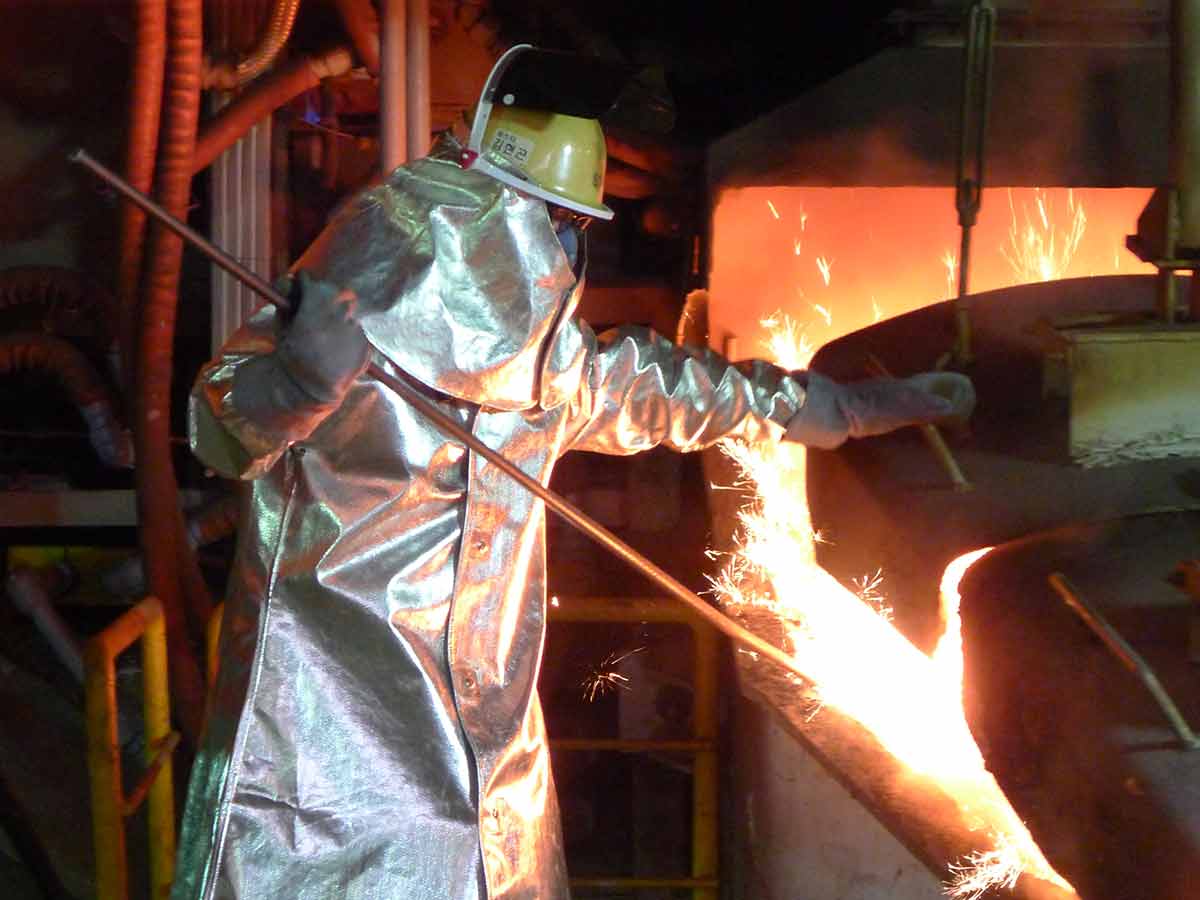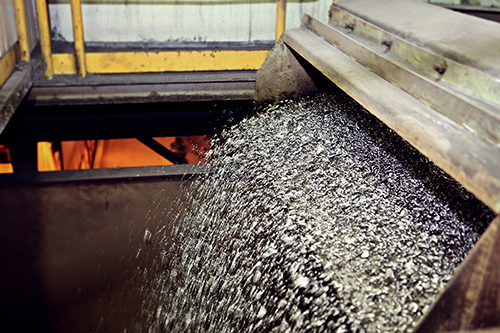Processing of ore supplied by NMC into ferronickel. With its rotary furnaces and two lines, the pyrometallurgical plant is designed to produce around 45,000 tonnes of ferronickel at nominal capacity.
The SNNC Plant is located in South Korea within the Gwangyang peninsula industrial complex, built in 1989 and dedicated in particular to steelworks.
346 at 31 December 2023.
Address: 2148-139, Jecheol-ro, Gwangyang City, Jeollanam-do
57812, Korea
Phone: +82-61-797-9114
Fax: +82-61-797-9191
Website : www.snnc.co.kr
Société du Nickel de Nouvelle-Calédonie et Corée (SNNC) is a company producing 54,000 tonnes of nickel metal contained in ferronickel annually from the NMC mines, since the extension of its capacity. The pyrometallurgical plant is located at the heart of the Gwangyang Industrial Complex in southern Korea. Its production is entirely sold to POSCO’s stainless steel plants.
The SNNC joint venture, whose capital equity is held by SMSP and POSCO, is managed by a six-member board of directors, three of whom are appointed by SMSP and three by POSCO.
The plant was built within an industrial complex in South Korea that already had all the necessary infrastructure, including an international port, a power station, roads and overland conveyors, which significantly reduced construction costs. At a cost of more than USD 352 million, construction was completed in less than 30 months.
The plant went into production on 20 October 2008, marking SMSP’s entry into the reserved and exclusive rights domain of metallurgy.
Eleven months later, the SNNC joint venture successfully reached full production capacity. This operation reflects the stability of the electrical production and the capacity to produce annually more than 25,000 tonnes of nickel metal contained in ferronickel.
On 7 May 2013, SMSP and POSCO signed an agreement to extend the ferronickel production plant. As a result, a second production line comprising a new unloading dock, an overland conveyor, ore storage and preparation area, a second drying facility, a third rotary kiln and a second electric furnace has been built on SNNC’s Gwangyang site. This second line, inaugurated on 6 March 2015, will enable the plant to increase its production capacity by a further 24,000 tonnes, for a total of 54,000 tonnes. In New Caledonia, NMC’s mines, with an initial annual production capacity of 1.8 million tonnes of saprolite ore, have also increased their production to 3.4 million tonnes with a nickel grade of around 2%.




A HIGH-PERFORMANCE INDUSTRIAL PROCESS
Once unloaded at the port of Gwangyang, the nickel ore is poured into rotary furnaces with coal. Dehydrated by the heat and combustion of the coal, it is transformed into calcined ore, which is charged into a hermetically sealed 94MW electric furnace maintained at very high temperature. The crude ferronickel produced contains around 20% nickel and 80% iron. The metal produced in the electric furnace contains sulphur impurities. The sulphur is eliminated by a de-sulphurisation process. An installation for the treatment of dust and gases containing sulphur and nitrogen (De-Sox and De-nox) preserves the environmental quality of the site. The purified liquid ferronickel is finally obtained in granular form using the granulation process. Once the metal has left the plant, the ferronickel slag is isolated and reused as material for tarmacking roads and for piling or earthworks.
In 2024, SNNC diversified its offering with low-carbon FeNi, an innovation that increases the market value of its products, guaranteeing solid sales volumes in a difficult market context.
MATTE PRODUCTION
From 2023, the company will take a further step forward with the conclusion of an agreement to build a ready-to-operate matte production unit to supply POSCO’s nickel sulphate plant. This is a strategic choice for positioning itself in the market for batteries for electric vehicles, and matte has a higher market value than ferronickel.
SNNC will eventually produce 26,000 tonnes of ferronickel and 21,000 tonnes of matte. Thus SNNC, with the same volume of ore supply, will produce two types of products, ferronickel and matte, both products will be sold to POSCO.
Aware of the need for a sound environmental strategy to ensure the company’s sustainable development practices, SNNC is engaged on environmentally-friendly management of its natural resources. This enables the company to minimise air pollution discharges and strengthen water quality control thanks to its wastewater treatment plants and water recycling system.
SNNC is making bold investments in environmental facilities to reduce air pollutants, such as windscreens, a water sprinkler system, a conveying system and dust filters. The first rotary kiln, which includes a denitrification and desulphurisation system, is equipped with the latest clean technology.
SNNC makes every effort to preserve water quality in Gwangyang Bay. Industrial water used in processes is largely recycled and reused, and wastewater generated by certain processes is treated in water treatment facilities.
The slag generated by the production process forms hard, abrasion-resistant aggregates after cooling. It is fully recycled as backfill, flooring and roadbed material.
SOCIAL CONTRIBUTIONS
SNNC has developed the ‘SNNC Corporate Park’ activity within the company with the aim of creating a pleasant environment in certain city centre locations and creating rest areas. SNNC regularly organises environmental management activities, including the sharing of eco-bags to raise awareness of environmental protection among its employees and the general public.